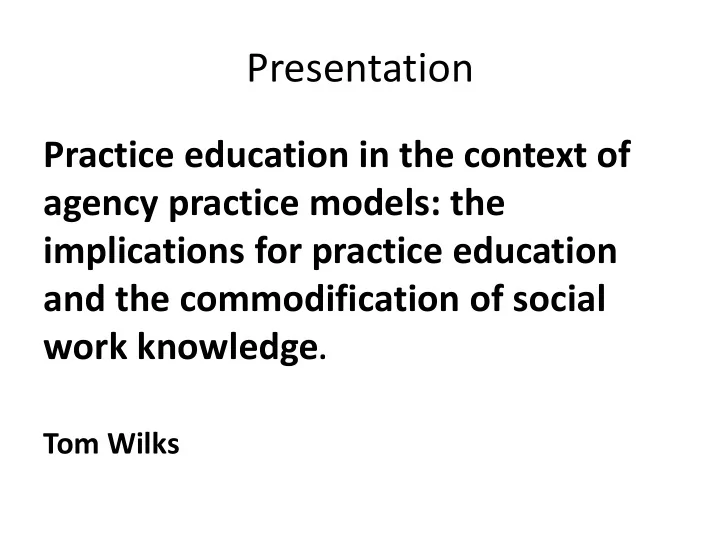

Presentation Practice education in the context of agency practice models: the implications for practice education and the commodification of social work knowledge . Tom Wilks
Approaches to theory • A specific theoretical orientation • A particular favourite theory • Embracing eclecticism
Key areas I want to explore • The development of practice knowledge in social work and the current policy context for this • Agency practice models • The concept of commodification of professional knowledge and practice in social work
Key areas I want to explore • I am largely supportive of agency practice models • The spirit of exploration not of polemic
Policy context • Rethinking children’s social work - Department for Education Children’s Social Care Innovation Programme and its off-spring • Overview report - Department for Education Children’s Social Care Innovation Programme April 2014
Wider policy context • Changes in social work education • Development of front-line, step up routes and apprenticeships • Social worker accreditation
Rethinking children’s social work – key questions • How do we want our social workers and other professionals to help our most vulnerable children and families? • What are we asking practitioners to achieve? • And what kind of environment and practice model would best enable them to achieve this? • Work underpinned by a particular evidence- based theory and/or set of interventions that shape the way that social workers operate, both in direct work and in their critical thinking and decision making.
What shaped theory in the past Legitimation and creation of knowledge Tripartite structure Professional bodies/regulators Academic institutions Social work agencies and practitioners
What shaped the use of theory in the past Ideas of professional autonomy • Individual professional autonomy and judgement vs managerialism • Eclecticism • Evidence and outcome • Separation of bureaucracy and practice approach
What shaped policy in the past HCPC Professional Capabilities Framework • Non-specific • Social work professionally defined not contextually • Values orientated • Concept of professionalism
Current policy process • More diffuse process • Compact between government and private sector • Transforming public services agenda
Commodification Marx’s notion of commodity which can be sold Applied to knowledge by Lyotard Lyotard’s commodification of knowledge ‘Knowledge in the form of an informational commodity indispensable to productive power is already, and will continue to be, a major -- perhaps the major -- stake in the worldwide competition for power’
Commodification process - knowledge 4 key elements Privatisation - inclusive rights of control Alienability - can be detached from the seller Individuation - can be separated from its context Valuation - given a monetary value
The new social work knowledge Innovations projects • Scalability • Fidelity • Worker autonomy • Prescribed approaches • Commodification of knowledge? ……….probably not
Wider context • Evidence based practice • Innovation • Individually focused • Technical
Agency practice models Scenario 1 - solution focused working In this scenario a student is working with a depressed bereaved parent who has recently lost their mother on whom they greatly depended. The parent is struggling to adequately care for their child. In supervision the student seems a little reluctant to embrace theoretical frameworks around the stages of grief or to think about whether there are any limits of solution focused working in this case.
Agency practice models Scenario 2 – motivational interviewing In this scenario during a 4 way meeting with a social work tutor and a work-based supervisor a discussion is going on about how to help a previously drug dependent parent whose children’s school attendance has become a matter of some concern. The service user has voiced the view that there is a risk of sinking back into a drug taking lifestyle. The student suggests a range of possible cognitive-behavioural interventions around relapse prevention; mapping potential triggers and exploring cravings. The work-based supervisor is quite assertive in arguing that MI should be the first choice of intervention in this case.
Agency practice models Scenario 3 – systemic working In this scenario the student is writing the final report and seeking advice around linking theory and practice. The service user being discussed at has recently been evicted from home and been supported by the student in finding somewhere else to live. The student is reluctant to think about crisis intervention as a theoretical framework for understanding this situation and wants to apply systems theory even though crisis intervention seems a better fit.
Final question • What will enable practice educators to thrive in this new environment?
Some reading on commodification • Castre, N (2003) Commodifying what nature Progress in Human Geography 27,3 p273-297 • Kauppinen, I (2014) Different Meanings of Knowledge as a Commodity in Higher Education, Critical Sociology , vol 40(3) p393-409 • Hyland, T (2016) The erosion of right livelihood: counter- educational aspects of the commodification of mindfulness practice Person-centred and experiential psychotherapies , Vol15 (3) p177-189 • Lyotard, F (1984) The Post Modern Condition: A Report on Knowledge . Manchester: Manchester University Press
Recommend
More recommend